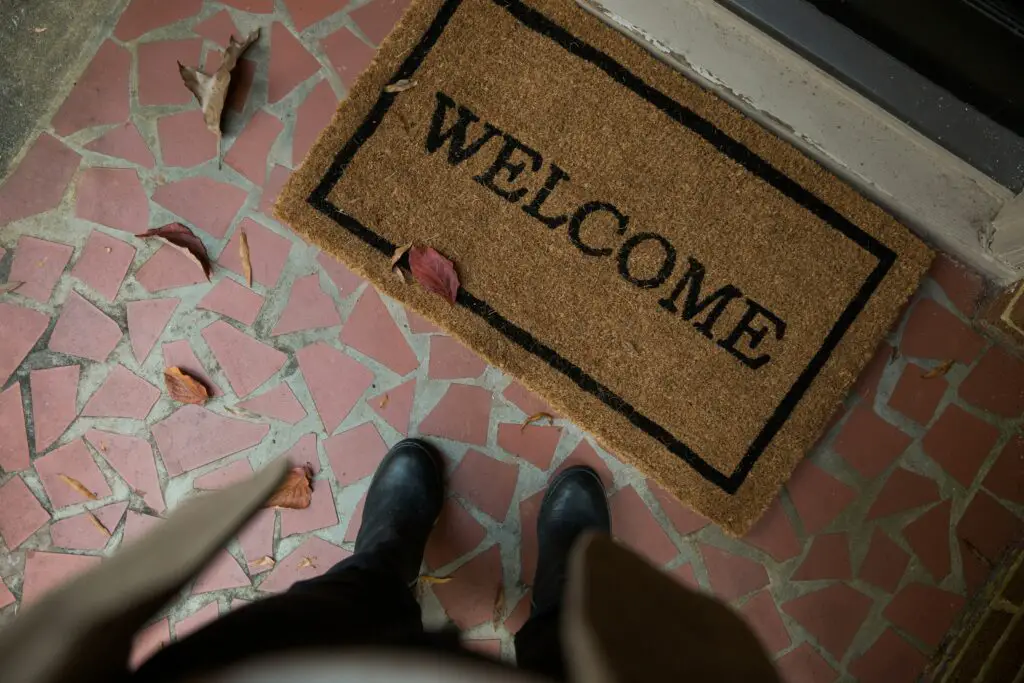In this jarring video clip, a teenager captures the moments when a police officer prevents him from closing the door to his home. In the video, a police knock and talk seemingly resulted in the infringement of multiple rights.
It first shows the officer standing at the boy’s front door. The teenager exclaims, “This is my residence; you can’t step foot in my house.” Defiantly, the officer props his foot on the doorframe, effectively preventing it from closing. He fires back at the boy, saying, “Yes, I can,” and “I’m investigating a crime,” pointing at the boy’s dog.
After being asked for his identification, the teenager denied it and explained that he didn’t have an ID and was under 18. The teenager stood his ground, asking the officer for a valid warrant. The two continued to argue with no clear resolution in sight.
Was the officer warranted in blocking the teen’s door? Are police knocks and talks allowed to escalate in this way?
What Are Knock and Talks?

Police use a knock-and-talk as a common strategy to investigate an area without a warrant. During a knock-and-talk, officers knock on someone’s door and request to question or search them. They typically use this approach when investigating an area without a valid warrant.
Knock and talk can be potent tools for officers. They can allow officers to gather information, question possible suspects or witnesses, and further an investigation promptly. Additionally, if someone opens their door to the police, the entrance to their home is subject to the plain view doctrine. This can allow police to seize criminal paraphernalia without the use of a warrant legally.
Throughout their history of use, knocks and talks have been polarizing for the general public. This polarization has led to the creation of jurisdictional knock-and-talk laws that differ by state and region. Numerous major court cases have stemmed from conflicts brought to form by knocks and talks.
The Rules of Police Knock and Talks
To protect the public’s rights, knock-and-talks are subject to various rules and stipulations. First, police must adhere to an “implied license” that the homeowner creates. Put simply, a homeowner is generally open and accepting of visitors from time to time.
Like mailmen and other strangers who may knock at your door, police must follow typical etiquette for knocking. In other words, they must knock on doors that are generally accessible to the public and equipped with accessories such as knockers or doorbells that indicate they are public entrances.
Likewise, police must leave a residence if they are denied access explicitly and implicitly. For instance, if someone doesn’t answer but is home, officers cannot stay. Similarly, if people explicitly ask the police to leave, the officers must go without a warrant.
The scope of a police knock and talk falls on what they ask and what you agree to. When police ask to search your home or question you, it is up to you to respond. If you disagree with the search, answering no or refusing to open the door is fine. If you agree to a search, the scope of the search relies on your response. For example, you can permit police only to enter a particular building or part of your home. If you say “yes,” police implicitly have permission to search anywhere around your property.
What To Do If You’re Subject to a Knock and Talk

If you find yourself subject to a police knock-and-talk, you should remain as calm and collected as possible. Regardless of whether the officer’s intentions are correct, getting frustrated can escalate a situation and lead to violence or further conflict.
Upon hearing a knock, if you don’t want to open the door to the police, you don’t have to unless they possess a warrant. Assuming you do open your door, you can decline them to search your home and ask them to leave. They legally cannot enter further unless they see any criminal offense in plain view.
If an officer does cross the line and continues to question or even enter your home, you should clearly state that you do not consent and ask for a warrant. It is often best to peacefully film the incident to provide tangible evidence of the events that took place. After the situation, you can consult a legal professional and contact the police station or city to open a formal complaint.
Was The Cop Justified on this Knock and Talk Video?
Now, you may be wondering, given all of these rules regarding knock and talks, was the cop in the video acting legally? Courts have deemed physically blocking someone from closing their door unconstitutional multiple times.
As the teen said in the clip, he is not legally obligated to answer the officer’s questions. This right falls under the Fifth Amendment, which protects against self-incrimination. The Sixth Amendment also applies, allowing a parent to be present during police questioning. Additionally, the Fourth Amendment protects the teen from unwarranted search and seizure.
Due to these reasons and the kid repeatedly asking the officer to leave, the officer’s actions were neither warranted nor justifiable. Therefore, the teenager was right to ask the officer to leave while recording calmly.

